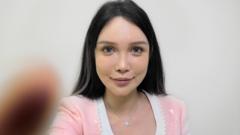**
Amidst China's evolving beauty ideals, Abby Wu stands out as a leading figure in the nation's cosmetic surgery boom, having undergone more than 100 procedures since her first surgery at just 14 years old. Driven by social pressure and changing beauty standards, she has spent approximately half a million dollars on surgeries that range from liposuction to face-slimming injections. Wu's journey, which began with her mother’s encouragement to regain confidence, exemplifies the increasing normalization of cosmetic enhancements in China.
Once a topic shrouded in stigma, plastic surgery has become a prevalent choice for many young women, with statistics revealing that around 20 million Chinese individuals opt for cosmetic procedures annually—80% of whom are women, averaging 25 years old. Wu's online presence on platforms such as SoYoung mirrors a larger trend where influencers share their transformation stories, influencing perceptions of beauty and desirability. While popular features include double eyelids and sculpted jawlines, alarming trends like botox injections aimed at achieving a doll-like appearance are also rising.
Unfortunately, as the demand surges, so does the prevalence of unlicensed clinics. A shocking report indicated that nearly 80,000 clinics operate without proper licensing, leading to numerous incidents of botched surgeries. Dr. Yang Lu, a licensed plastic surgeon in Shanghai, indicates that the number of patients requiring repairs from failed operations is climbing. Yue Yue's story illustrates this reality, as she suffered severe repercussions from an unqualified practitioner, leading to expensive corrective surgeries that still don’t guarantee complete recovery.
The darker side of the cosmetic surgery culture includes scams that prey on vulnerable individuals seeking employment. Stories like that of Da Lan, who was manipulated into undergoing surgery as a condition for a nonexistent job, spotlight the exploitation rampant in the industry. Meanwhile, beauty apps like SoYoung exacerbate these pressures by perpetuating unrealistic beauty standards, suggesting surgical interventions even to those who have already undergone multiple procedures.
Despite the myriad of risks, Wu remains unfazed, fully committed to her pursuit of beauty, viewing her transformations as a path to greater self-worth and happiness. In a society where appearance greatly influences job prospects, many are lured into the world of cosmetic surgery with the hope of finding success and acceptance, reflecting significant changes in cultural attitudes towards beauty in modern China. The journey is fraught with challenges, but for many, it is a journey they are willing to take.
Amidst China's evolving beauty ideals, Abby Wu stands out as a leading figure in the nation's cosmetic surgery boom, having undergone more than 100 procedures since her first surgery at just 14 years old. Driven by social pressure and changing beauty standards, she has spent approximately half a million dollars on surgeries that range from liposuction to face-slimming injections. Wu's journey, which began with her mother’s encouragement to regain confidence, exemplifies the increasing normalization of cosmetic enhancements in China.
Once a topic shrouded in stigma, plastic surgery has become a prevalent choice for many young women, with statistics revealing that around 20 million Chinese individuals opt for cosmetic procedures annually—80% of whom are women, averaging 25 years old. Wu's online presence on platforms such as SoYoung mirrors a larger trend where influencers share their transformation stories, influencing perceptions of beauty and desirability. While popular features include double eyelids and sculpted jawlines, alarming trends like botox injections aimed at achieving a doll-like appearance are also rising.
Unfortunately, as the demand surges, so does the prevalence of unlicensed clinics. A shocking report indicated that nearly 80,000 clinics operate without proper licensing, leading to numerous incidents of botched surgeries. Dr. Yang Lu, a licensed plastic surgeon in Shanghai, indicates that the number of patients requiring repairs from failed operations is climbing. Yue Yue's story illustrates this reality, as she suffered severe repercussions from an unqualified practitioner, leading to expensive corrective surgeries that still don’t guarantee complete recovery.
The darker side of the cosmetic surgery culture includes scams that prey on vulnerable individuals seeking employment. Stories like that of Da Lan, who was manipulated into undergoing surgery as a condition for a nonexistent job, spotlight the exploitation rampant in the industry. Meanwhile, beauty apps like SoYoung exacerbate these pressures by perpetuating unrealistic beauty standards, suggesting surgical interventions even to those who have already undergone multiple procedures.
Despite the myriad of risks, Wu remains unfazed, fully committed to her pursuit of beauty, viewing her transformations as a path to greater self-worth and happiness. In a society where appearance greatly influences job prospects, many are lured into the world of cosmetic surgery with the hope of finding success and acceptance, reflecting significant changes in cultural attitudes towards beauty in modern China. The journey is fraught with challenges, but for many, it is a journey they are willing to take.




















